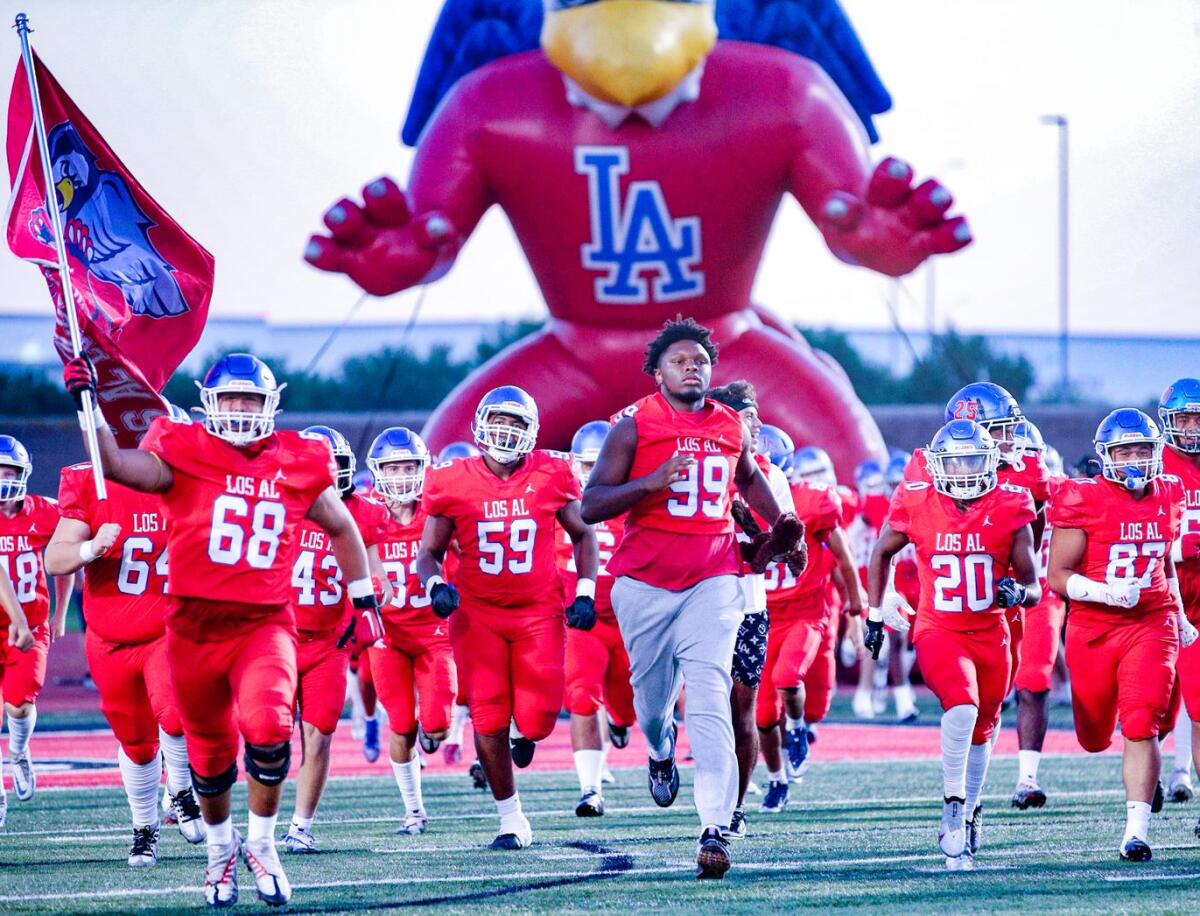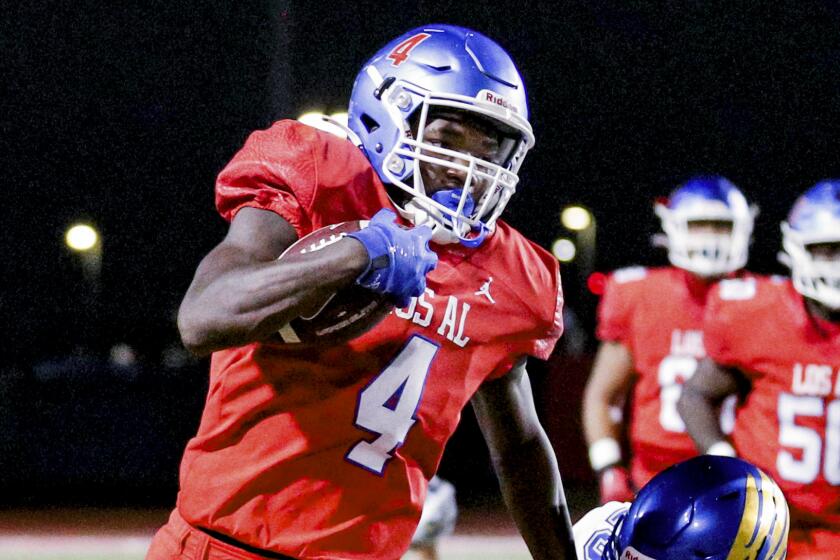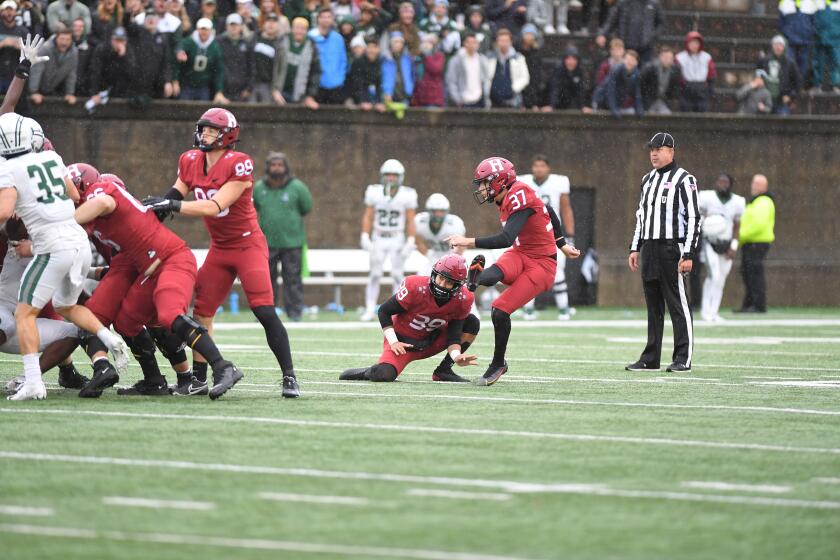Column: T.A. Cunningham’s transfer dilemma might be tip of NIL exploitation

- Share via
According to court documents, the shady, unscrupulous world of trying to exploit high school athletes for their earning potential in name, image and likeness has officially arrived.
The only question now is how many victims will there be?
T.A. Cunningham, a 6-foot-6, 265-pound junior defensive lineman who left his parents in Georgia to come to Southern California in search of a better life for himself and family, is facing rough times. He’s a student at Los Alamitos High with no football, no home and no money after putting his trust in people selling NIL as a quick fix.
“These people screwed him out of his eligibility,” attorney Michael Caspino said.
All it led to was a hearing in Orange County Superior Court on Thursday that laid out the troubling story of a teenager stranded in California with dwindling options for the next year.
Cunningham has been unable to gain eligibility at Los Alamitos, with the judge declining to approve an injunction against the CIF Southern Section, the state’s governing body for most high schools in the Southland, which declared him ineligible.
Damian Henderson rushed for 303 yards and five touchdowns as Los Alamitos ran away with a 69-43 win over Santa Margarita on Thursday.
Now the Southern Section has begun a CIF Bylaw 510 undue influence investigation thanks, in part, to information laid out in the court petition that makes it clear Cunningham moved to California to earn NIL deals to support his family.
His chance of gaining eligibility doesn’t look good based on the CIF’s change of residence guidelines that in part state: “A student may not be eligible to participate at the varsity level if there is evidence the move was athletically motivated or the student enrolled in that school in whole or part for athletic reasons.”
This case is the perfect example of the fears many had that the unleashing of NIL among college athletes would trickle down to high school, with an unregulated, unproven group of individuals racing to capitalize.
“I am hoping this is a tremendous wake-up call for everybody about the vermin taking advantage of high school athletes,” Caspino said.
According to the court petition, Chris Flores, a well-known youth coach in Orange County and co-founder of a marketing agency, helped set up a plan for Cunningham to move to California to earn NIL deals. Flores has since been charged with molesting a 15-year-old girl. Flores has pleaded not guilty to four felony counts of committing a lewd act on a child and two counts of sexual penetration by a foreign object.
Caspino, based in Newport Beach, is an NIL lawyer himself. On3.com reported that it is believed he’s the one who negotiated a multi-million dollar NIL deal involving Tennessee commit Nico Iamaleava of Downey Warren High.
You have NIL people fighting with NIL people for top recruits. It’s only going to get worse.
The CIF is entrusted with trying to protect the integrity of education-based high school sports in the state.
Chaminade High grad and Harvard kicker Jonah Lipel talks about the Ivy League experience in the ever-changing world of college football and NIL deals.
Its rules haven’t changed with the introduction of NIL deals at the college level. High school athletes in California have always been able to receive money for endorsement deals as long as they weren’t representing their schools. There have been plenty of teenage actor/athletes through the years.
Yet the newness of the NIL world has led to a mad scramble, with parents lacking knowledge of what’s at stake, creating opportunities for people to exploit and manipulate families all in the name of “helping kids.”
There’s no real solution other than to slow down, do background checks and get better advice from reliable, proven professionals.
This environment is reminiscent of the days high school athletes could declare for the NBA draft. In 1998, Ellis Richardson from Sun Valley Poly High did just that. He went undrafted, quit basketball and ended up in prison for eight months after being convicted for a robbery. Plenty of teenagers with pro dreams faced harsh reality checks. In 2005, the NBA implemented a minimum age requirement of 19, and you had to be at least one year removed from high school.
An intervention might be needed with NIL deals for high school athletes before victims start piling up.
Staff writer Luca Evans contributed to this column.
More to Read
Get our high school sports newsletter
Prep Rally is devoted to the SoCal high school sports experience, bringing you scores, stories and a behind-the-scenes look at what makes prep sports so popular.
You may occasionally receive promotional content from the Los Angeles Times.









